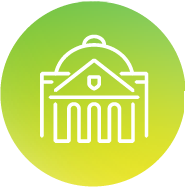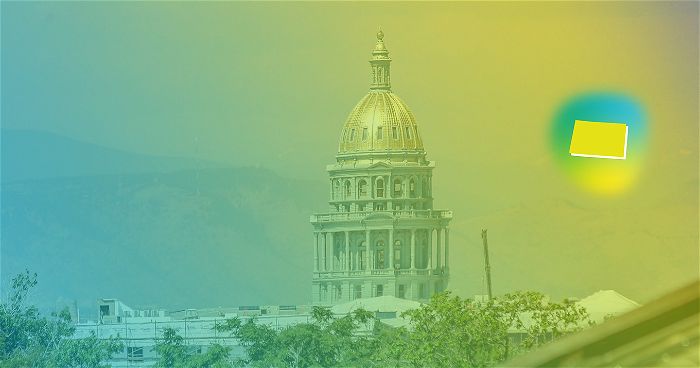
The Big Blur: Recent State Legislative Priorities Embrace Cross-System Collaboration to Support Students
May 11, 2023
Jobs for the Future (JFF) is tracking state legislation that aligns with our vision for the Big Blur—erasing the arbitrary boundaries between high school, college, and careers to help all students prepare for success in the labor market.
In this blog, we spotlight a handful of the most promising policies, enacted in California, Colorado, and Illinois, as well as bills under consideration in the 2023 legislative sessions in Colorado, Illinois, Massachusetts, and Tennessee.

These bills reflect meaningful progress in key components of the Big Blur, namely:
- Incentives for accountability and financing to promote new ways of organizing learning

- Alignment of high schools, colleges, and labor markets so that 11th-grade students enter new institutional structures focused on postsecondary and career preparation

- Governance model that unifies decision-making authority over grades 11-14 as well as over districts and postsecondary institutions that are working as a unified institution

- Staffing structures designed for effectively organizing learning and work experiences and support systems for older adolescents in grades 11-14
Common themes in these bills include demonstrable commitment to addressing the future of work in high school, improving data collection and transparency, streamlining the transitions between secondary and postsecondary, supporting career exposure in middle school with clear information about available multiple pathways, and investing in early college programs and initiatives to engage employers in pathways development and work-based learning experiences.
While JFF applauds this forward momentum, none of these policies achieve the magnitude of transformational systems change required by the Big Blur. Rather, in our assessment, these policies represent improvements fitting the “coordinated” and “integrated” building blocks described in JFF’s state policy framework for the Big Blur. Nonetheless, these bills suggest states are building toward legislation that could support the full blurring of K-12, postsecondary, and workforce.
Examples of promising bills that passed in 2022 include:
- California AB-2508, “An Act to Amend Section 49600 of the Education Code, Relating to Pupil Services”
This bill amends existing law to require that educational counseling also includes postsecondary options to encourage participation in college participation programs, including dual enrollment and early college programs.- Connections to the Big Blur: The creation of more robust navigational supports is one step toward streamlining students’ experiences between secondary and postsecondary.
- Colorado HB22-1349, “Postsecondary Student Success Data System”
HB22-1349 charges the Colorado Commission on Higher Education with developing new measures for student success in postsecondary education and the labor market. In addition, the 1349 legislation appropriates $3 million from the workers, employers, and workforce centers fund for the Department of Higher Education to create and maintain a statewide student success data system, including institution-specific interfaces and a public interface.- Connections to the Big Blur: A transparent longitudinal data system evenly accessible from K-12 to workforce outcomes is a key element of a fully blurred system. It will effectively develop a way for systems to track the return on investment of various pathways, degrees, and credentials over an earner’s life. It should create a feedback loop to spur continuous program improvements. Colorado’s proposal would move toward that finished product.
- Illinois 102-0917, “Sec. 10-20.83. College and Career Readiness Systems”
This act amends the Postsecondary and Workforce Readiness Act (PWR Act of 2016) to adopt and implement career exploration and development activities for grades 6-12 by July 2023. All activities must align to the framework established in the PWR Act and prepare students “to make informed plans and decisions about their future education and career goals, including possible participation in a career and technical pathway, by providing students with opportunities to explore a wide variety of high-skill, high-wage, and in-demand career fields.”- Connections to the Big Blur: This alignment to labor market information and early career exposure, while not yet offering a fully blurred middle and high school experience, lays the groundwork for greater understanding of what students’ career experiences could be as well as what postsecondary opportunities are available.
Here’s a list of bills making their way through the 2023 state legislative process that enable a component of the Big Blur:
- Colorado SB23-065, “Career Development Success Program”
Colorado’s Career Development Success Program, previously named Career Development Incentive Program, provides school districts and charter schools with financial incentives for high school students to complete an industry credential program, workplace training program, or computer science Advanced Placement course. Currently, the state appropriates $1 million for this program, but this bill would increase the funding to $10 million. Specifically, “the bill requires a school district or charter school participating in the program to receive 120% of the per-pupil amount for each pupil who is eligible for free or reduced-price lunch and who successfully earned an industry certificate by completing a qualified industry-credential program, a qualified workplace training program, or a qualified advanced placement course.” As of May 8, 2023, the legislation passed out of both the Senate and the House and is awaiting the governor’s signature.- Connections to the Big Blur: The bill is an example of incentives for funding that revolve around measures of outcomes and would elevate the importance of college in high school and work-based learning programs. This would set groundwork for transformed funding and cohesive accountability systems for grades 11-14.
- Illinois HB2289/SB2437, “General Revisory”
This general advisory bill passed the House in its third reading and includes a clause that would require districts to adopt and implement career exploration and development activities aligned with the state’s Postsecondary and Career Expectations (PACE) framework (under the PWR Act). The Illinois Student Assistance Commission, Illinois State Board of Education, Illinois Community College Board, and Illinois Board of Higher Education developed the PACE framework. It outlines an individual plan for career and postsecondary education and training each student should complete in grades 8-12. The goal is for a student to plan a course of study and grasp associated costs. Districts would provide college and career exploration programming, and actionable learning opportunities would support the framework.- Connections to the Big Blur: Transformative partnerships between school districts, colleges, and businesses position students to pursue their career goals in an efficient and cost-free way. Collaboration is essential to Illinois’s new bill, and the state can continue to build upon this alignment.
- Massachusetts H.592, “An Act to Create and Expand Student Pathways to Success”
This bill would create a workforce skills cabinet based in the governor’s office to act as a cross-agency governance structure. The cabinet would advise the governor and executive branch agencies as well as coordinate the programs and policies of the executive offices of labor and workforce development, education, and housing and economic development. The purpose is to improve and expand workforce skills and college and career readiness to meet current and future commonwealth needs.- Connections to the Big Blur: This cabinet would be a step toward blurry governance and an improved systems alignment. Multiple departments serving overlapping populations would have a single governing body to ensure collaboration and shared visioning, a component missing from many interagency partnerships.
- Tennessee HB0902/SB0461, “Future of Work Commission”
This would create a new commission on the future of work to govern the state’s education and workforce data center activities. The head of the commission, who would be independently employed, would work with contributing agencies, including the departments of education, labor and workforce development, economic and community development, children’s services, and human services, plus the Higher Education Commission. In addition to promoting systems alignment and shared governance, this bill also would require developing a public website to share disaggregated data on pathways from education into the workforce and workforce outcomes. There is language to ensure this information stays transparent to the public and easily understandable.- Connections to the Big Blur: Having a recognized governing body with authority to oversee grades 11-14 is an important factor in the Big Blur. This commission holds the potential to be part of that goal. The commission must have decision-making authority and shared accountability across secondary and postsecondary programs.
Creating Blurrier State Policies and Programs
In monitoring state legislative trends, JFF is consulting with state-based advocacy organizations nationwide that share our passion for the Big Blur. They offered insights on the most effective and promising bills, and they also expressed their advocacy priorities aligned with the Blur.
The state advocacy organizations are pushing for blurrier state policies and programs that best fit the immediate needs of their communities. These groups want to set up states and individuals for long-term success. They have also used common strategies to achieve these goals in this legislative session, including:
- Expansion of access to in-demand credentials through funding opportunities offering incentives for providers
- Supporting the implementation of state and federal grants aligned to rural regions and industry-aligned pathways by building out partnerships between K-12, higher education, and employers
- Ensuring all students receive free postsecondary opportunities
- Using policy to clarify liabilities of youth under 18 on jobs sites through work-based learning
- Increasing engagement with employers, including setting up future incentive policies for employers to participate in work-based learning and invest in training providers
- Strengthening data systems and providing incentives for data-informed practices to meet local communities’ specific needs

Related Content

Toward the Big Blur: State Governance of a Unified Education-to-Workforce System That Works for Everyone
Jobs for the Future’s (JFF) vision for the Big Blur calls for entirely new educational institutions and systems to better prepare 16-to-20-year-olds for college and careers. This paper examines the new type of governance needed…

The Big Blur
An argument for erasing the boundaries between high school, college, and careers, and creating one new system that works for everyone. The Problem It’s time to give up tinkering and instead take on a radical…

Dual Enrollment Is Taking Over Community College: Is a New Institution Emerging?
August 10, 2023
The Big Blur: An Argument for Erasing the Boundaries Between High School, College, and Careers —and Creating One New System That Works for Everyone
This paper argues for a radical restructuring of education for grades 11–14—by erasing the arbitrary dividing line between high school and college—to open opportunities for the learners our current systems leave behind. We make the…

Toward the Big Blur: Momentum and Progress in Colorado
In this first in a series of case studies featuring leading-edge states, Jobs for the Future (JFF) documents key policies that Colorado is putting into place to erase the arbitrary boundaries between high school, college,…

Financing the Future
JFF’s Financing the Future initiative reimagines the way we finance education and skills development. JFF’s Financing the Future initiative reimagines the way we finance education and skills development. Our team is made up of individuals…

Pathways to Prosperity
We are boldly reimagining how U.S. education and workforce systems meet state and regional talent needs and prepare young people for careers. We are boldly reimagining how U.S. education and workforce systems meet state and…

Postsecondary Network
Reforming math in Florida, ensuring equity in Washington, boosting student support in Michigan, partnering with the workforce system in New Jersey—JFF’s renowned network advances policies and practices that help all students attain high-value credentials. Reforming…

Policy & Advocacy
We are advancing evidence-based policy to enact changes in the education system and the workforce. Nearly half of U.S. workers are in low-paying jobs. Systemic issues in education, employment, and workforce development prevent millions of…

